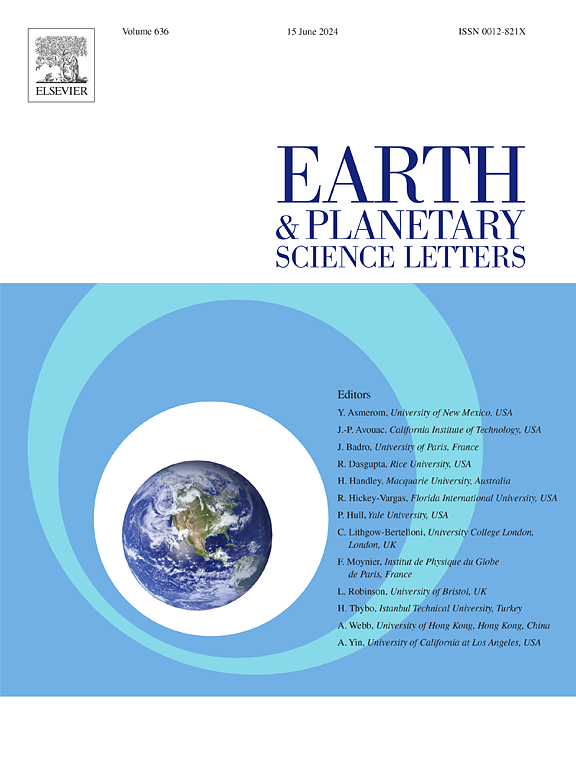Magnetotelluric image of the Patagonian slab window: Constraints on upper mantle physical properties and sources of intraplate magmatism
IF 4.8
1区 地球科学
Q1 GEOCHEMISTRY & GEOPHYSICS
引用次数: 0
Abstract
The Patagonian slab window (PSW) is a region of the Southamerican subduction zone where the absence of subducted slabs is interpreted, due to the subduction of the Chile Mid-Ocean Ridge at the Chile Triple Junction. Here we report the results of a long-period magnetotelluric (MT) study conducted in two 300 km-long trench-parallel transects crossing the northern boundary of the PSW in the proximal backarc. We modeled the MT data using 3-D inversion, obtaining an electrical resistivity model of the continental crust and upper mantle up to a depth of ∼150 km. Our model shows a heterogeneous resistivity structure in the uppermost mantle, dominated by resistivities >300 Ωm below the array of sites even within the PSW, and some low-resistivity zones (LRZs, <10 Ωm) mainly at the edge of the array. Using petrophysical models, we estimated the mantle temperature, water content, melt fraction, and viscosity based on obtained resistivity values and a preexistent model of P-wave velocity (Vp) at 50 km and 100 km depth. These estimates suggest that the uppermost mantle within the PSW region is heterogeneous and dominated by high-viscosity blocks, compatible with the continental mantle lithosphere or even subducted slabs. Based on relatively hot and low-viscosity zones estimated in the periphery of LRZs, we interpret the presence of asthenospheric mantle in areas where LRZs coincide with relatively low Vp. According to this interpretation, asthenospheric upwelling in the study area at depths ≤150 km would be localized rather than ubiquitous over the interpreted extent for the PSW. Such localized asthenosphere upwelling processes in the past could explain the scattered distribution of Neogene basaltic lavas in the southern Patagonia backarc. The continental crust exhibits LRZs in the upper and lower crust. Remarkably, ensembles of LRZs at different crustal depths within the presumable area of the PSW were found below the General Carrera Lake, and towards the North Patagonian Icefield, likely indicating the presence of hidden intraplate magmatic and/or hydrothermal systems.
巴塔哥尼亚板块窗口的磁位图象:对上地幔物理特性和板内岩浆活动来源的制约
巴塔哥尼亚板块窗口(Patagonian slab window,PSW)是南美洲俯冲带的一个区域,据解释,由于智利三交界处的智利大洋中脊的俯冲,该区域没有俯冲板块。在此,我们报告了在两条长达 300 公里的海沟平行横断面上进行的长周期磁测(MT)研究的结果,这两条横断面穿越了近端弧背的 PSW 北部边界。我们利用三维反演对磁法数据进行了建模,获得了深度达 150 千米的大陆地壳和上地幔电阻率模型。我们的模型显示了最上层地幔的异质电阻率结构,主要是电阻率>300 Ωm,甚至在PSW内的站点阵列下方,以及一些低电阻率区(LRZs,<10 Ωm),主要位于阵列边缘。利用岩石物理模型,我们根据获得的电阻率值和已有的 50 千米和 100 千米深度的 P 波速度(Vp)模型,估算了地幔温度、含水量、熔融率和粘度。这些估算结果表明,PSW 区域内的最上层地幔是异质的,主要是高粘度块体,与大陆地幔岩石圈甚至俯冲板块相吻合。根据在LRZ外围估计的相对热的低粘度区,我们解释了在LRZ与相对低Vp相吻合的地区存在着星体层地幔。根据这一解释,研究区域内深度≤150千米的星体层上升流将是局部的,而不是在所解释的PSW范围内普遍存在的。过去这种局部的星体层上升流过程可以解释新近纪玄武岩熔岩在巴塔哥尼亚背弧南部的分散分布。大陆地壳的上部和下部均表现出低辐射区。值得注意的是,在General Carrera湖以下和北巴塔哥尼亚冰原方向,在推测的PSW区域内的不同地壳深度发现了成组的LRZ,这很可能表明板内存在隐藏的岩浆和/或热液系统。
本文章由计算机程序翻译,如有差异,请以英文原文为准。
求助全文
约1分钟内获得全文
求助全文
来源期刊

Earth and Planetary Science Letters
地学-地球化学与地球物理
CiteScore
10.30
自引率
5.70%
发文量
475
审稿时长
2.8 months
期刊介绍:
Earth and Planetary Science Letters (EPSL) is a leading journal for researchers across the entire Earth and planetary sciences community. It publishes concise, exciting, high-impact articles ("Letters") of broad interest. Its focus is on physical and chemical processes, the evolution and general properties of the Earth and planets - from their deep interiors to their atmospheres. EPSL also includes a Frontiers section, featuring invited high-profile synthesis articles by leading experts on timely topics to bring cutting-edge research to the wider community.
 求助内容:
求助内容: 应助结果提醒方式:
应助结果提醒方式:


